Natural gas is one of the most efficient and reliable energy sources for both homes and businesses.
From heating spaces and water to powering stoves and dryers, natural gas appliances deliver comfort, control, and cost savings. But like any system that runs day in and day out, these appliances require regular attention to ensure they operate safely and efficiently.
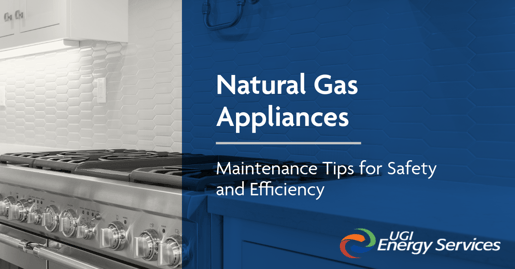
At UGI Energy Services (UGIES), we understand that natural gas does more than keep the lights on—it keeps families comfortable and businesses running smoothly.
As shorter days and cooler weather have people spending more time indoors the next few months, this is a good time to review proper maintenance tips to ensure your natural gas appliances are performing at their best.
Furnaces
Few natural gas appliances work harder than a furnace, especially during the colder months. Understanding your furnace’s efficiency helps you stay comfortable while controlling energy costs. One important measure to know is the annual fuel utilization efficiency (AFUE), which indicates how effectively your furnace converts fuel into heat over the course of a year.
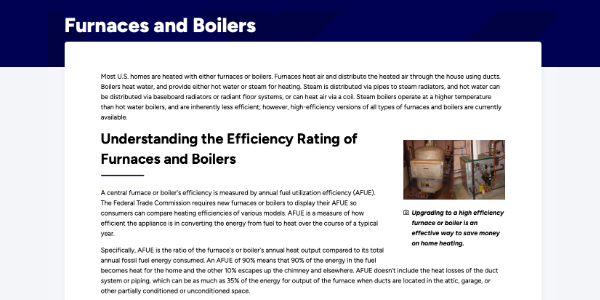
The Federal Trade Commission requires all new furnaces to display their AFUE ratings, allowing consumers to compare heating efficiency across models. For example, an AFUE of 90% means that 90% of the fuel's energy is turned into heat for your home. The higher the AFUE rating, the more fuel efficient your furnace is and the more money you save.
To keep your furnace running efficiently, it's necessary to perform annual maintenance to ensure safe, efficient operation and to avoid costly breakdowns when you need heat the most. A professional inspection should include checking and cleaning burners, inspecting the heat exchanger for cracks, and verifying that the ignition system functions properly. Dirty burners or blocked vents can reduce efficiency and be a safety risk.
Be sure to regularly change air filters. Clogged filters restrict airflow, forcing a furnace to work harder and consume more energy. Keeping vents and return registers clear of dust and away from furniture also helps maintain proper circulation and balanced heat throughout the home.
Water Heaters
Natural gas water heaters provide reliable, on-demand hot water, but mineral deposits and sediment buildup can reduce efficiency over time. Routine flushing, typically once a year, helps remove these deposits and prevent corrosion of the tank.
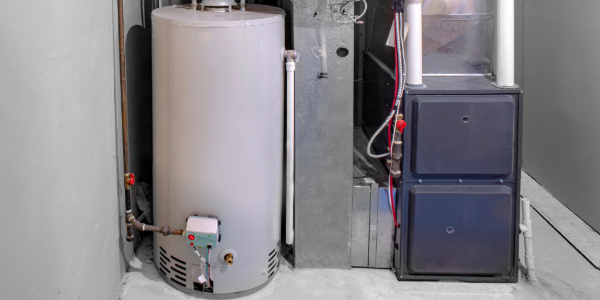
A technician should also check the burner assembly and venting system to ensure proper combustion and exhaust flow.
If you have a pilot-light model, make sure the flame burns steadily and is blue. A yellow or flickering flame can signal incomplete combustion and may require professional attention. For newer tankless water heaters, maintenance is just as important, including descaling the unit to maintain optimal heat transfer and efficiency.
Taking these small preventive steps can significantly extend your water heater’s lifespan while keeping hot water costs down.
Gas Stoves and Ovens
A natural gas range provides precision cooking control that electric models can’t match, allowing cooks to adjust temperature quickly. Simple maintenance habits can keep your gas stove operating efficiently, safely, and with the consistent heat that home chefs love.
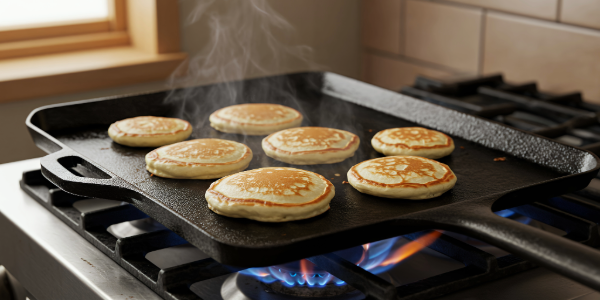
- Keep burners clean: Food spills and grease buildup can clog ports, affecting flame size and distribution. When burners are clean, flames should burn blue and steady; yellow or orange tips indicate incomplete combustion or debris in the burner.
- Ensure a tight seal: Inspect the oven door gasket periodically as a worn or cracked gasket allows heat to escape, leading to uneven cooking and wasted energy.
- Check your ventilation: Ensure that your range hood or exhaust fan is functioning properly to remove combustion byproducts and cooking odors from the kitchen.
Fireplaces and Vent-Free Heaters
Natural gas fireplaces and vent-free (ventless) space heaters add warmth and ambiance, but they, too, require seasonal care. Over time, dust, pet hair, and soot can accumulate inside vents and around burners, impacting combustion efficiency and air quality.
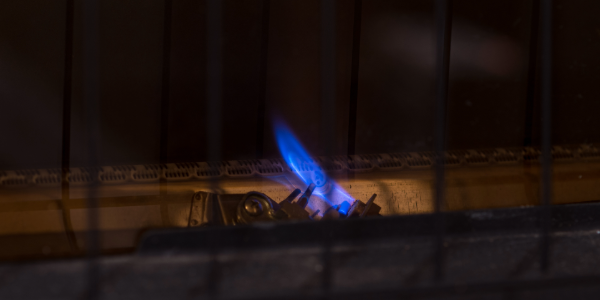
Before the heating season begins, have a technician inspect the pilot light, thermocouple, and venting system. Glass doors and ceramic logs should be cleaned gently to maintain clear visibility and prevent residue buildup that can affect the flame.
Always ensure that the room has adequate ventilation and never use a space heater in enclosed or poorly ventilated areas. These safety measures keep your living spaces warm, inviting, and fire hazard-free.
Natural Gas Safety Tips
The most recognizable warning of a natural gas leak is the smell of rotten eggs, caused by the odorant Mercaptan added to otherwise odorless natural gas. Other warning signs include hissing or whistling sounds from appliances, damaged fuel lines, unusually high gas usage, dying plants above underground lines, and bubbling water or soil movement.
If you suspect a leak, leave the building or area immediately and take others with you. Call 911 and your utility company immediately.
- Do not light a match or smoke.
- Do not turn appliances or lights on or off.
- Do not use a flashlight.
- Do not start a car.
- Do not use a phone
Always leave the house to call to report a suspected natural gas leak. Do not assume someone else will do it.
Carbon Monoxide Safety with Natural Gas Appliances
Carbon monoxide (CO) is a colorless, odorless gas produced during incomplete combustion of natural gas. Unlike natural gas, it cannot be detected by smell or sight. CO is another reason to have a qualified technician inspect all gas-burning appliances annually.
- Install carbon monoxide detectors on every level of your home.
- Never use outdoor gas heaters or grills indoors, and keep vents and chimneys clear of blockages.
- If your CO detector sounds an alarm, leave your home immediately and call 911.
For detailed carbon monoxide safety information, visit the Centers for Disease Control website.
Partner with UGIES for Safe and Efficient Natural Gas
From natural gas infrastructure to renewable natural gas (RNG) integration, UGIES is committed to helping customers get the most from their energy investment. Our team of energy experts can guide businesses in implementing energy solutions that enhance safety, efficiency, and sustainability.
Contact UGI Energy Services today to learn how we can support your energy needs with reliable, cost-effective natural gas solutions.




